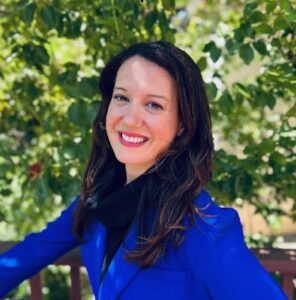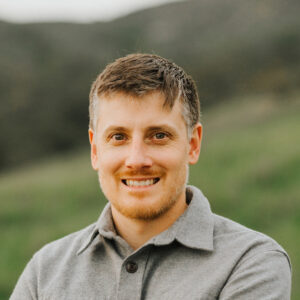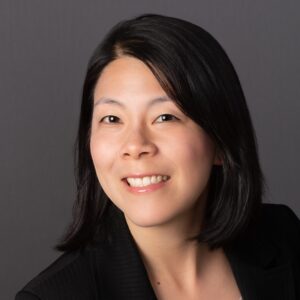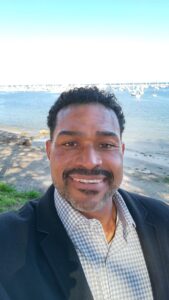Four Fall 2023 FUSE Executive Fellows in San Joaquin County, Los Angeles County, the City of Hayward, and King County are set to focus on alternative transportation, updating infrastructure, and reducing energy burden for a sustainable future for their communities.

Lauren Batalias — San Joaquin County, CA
FUSE Project: Sustainable Transportation Strategies for Underserved Communities
San Joaquin County in California faces significant challenges, from inadequate housing for lower-income workers to the threat of severe weather patterns impacting individuals and the agricultural sector. The county’s infrastructural issues, stemming from years of systemic bias and underinvestment, put areas with higher populations of people of color and low-income individuals at a greater risk. Moreover, an impending housing shortage, with over 20,000 units expected by the end of the year and a possible 250% increase in the next eight years, exacerbates the situation. In response, the San Joaquin Council of Governments (SJCOG) aims to leverage state funds to initiate infrastructure improvements for equitable housing and transportation. The State of California has made approximately $600 million available for local governments to speed up infill housing development, support affordable housing, and decrease vehicle miles traveled.
To tackle these issues, SJCOG is partnering with FUSE to enlist the help of Executive Fellow Lauren Batalias, who will spearhead strategic planning for transportation initiatives. Batalias is a senior public policy and strategic planning expert with 15+ years of experience in public policy and program management, with special expertise in sustainable transportation, climate, and housing issues across multiple jurisdictions. In addition, she has led many government and community relations efforts, negotiations, and, most recently, managing innovative mobility and regional transportation planning studies. She is a former Seattle Planning Commissioner with a J.D. from Rutgers University School of Law and a Conflict Resolution and Mediation certificate. She expects a Transit and Paratransit Management certificate from the University of the Pacific this fall.
It is an honor to have the opportunity to apply over 15 years of experience in policy, programs, and engagement in sustainable transportation, climate, housing, and land use, to help achieve equitable, implementable, strategies and best practices in partnership with San Joaquin region’s underserved communities. I sincerely hope the community will benefit from an actionable plan to increase access to affordable, sustainable transportation options in priority housing areas, as well as the region as a whole.

S. Neil Larsen — King County, WA
FUSE Project: Reducing the Utility Burden on Frontline Communities
The community in King County is grappling with the issue of energy justice, particularly for marginalized groups, including BIPOC, immigrant, refugee, and LGBTQIA+ communities. The King County Strategic Climate Action Plan (SCAP) specifically highlights these concerns, focusing on reducing the energy and utility burden on frontline communities, expanding renewable energy and energy efficiency in these communities, and integrating their expertise into policy decisions. A major hurdle is the utility burden on renters, particularly those in multi-family dwellings. They often lack the knowledge or ability to make necessary energy efficiency alterations and are not always aware of the utility costs included in their rent. These issues have led to an increased prevalence of negative coping strategies and highlight a significant area for action as King County seeks to make its climate change strategies and opportunities more accessible.
FUSE Executive Fellow S. Neil Larsen, partnering with King County, will work over the course of a year to address this issue. As a consultant and nonprofit leader, Larsen has over 15 years of experience in the conservation, sustainability, and workforce development fields. He was most recently the Executive Director of a nonprofit in Berkeley, CA that provided job training internships to youth and expanded access to sustainable transportation in the community. He has a BA in history from Bates College and a master of international affairs, with a concentration in environmental and energy policy, from Columbia University.
There is a huge need and opportunity to ensure that frontline communities benefit from the transition to the clean energy economy. I see this project as a way to help the communities who are the most vulnerable to the effects of climate change.

Sumin Sohn – Los Angeles County, CA
FUSE Project: Funding Infrastructure for a Sustainable Future
Los Angeles County strives to create a sustainable community for its nearly 10 million residents. To achieve this goal, the Chief Sustainability Office (CSO) and the Department of Public Works have formed the Environmental, Sustainability, & Resilience Committee of Infrastructure LA. This committee aims to align individual infrastructure projects with the County’s overall vision and secure funding for sustainable initiatives. Community engagement, stakeholder input, and transparency are crucial in advancing the Our County Sustainability Plan, which envisions a safe, healthy, and just future for Los Angeles County.
In this context, FUSE Executive Fellow Sumin Sohn will play a pivotal role in managing the Environmental, Sustainability, & Resilience Committee’s work. Sohn is a sustainability project manager passionate about fostering cross-sector collaborations to find innovative, environmentally, and economically beneficial solutions. Most recently, Sohn served as the Director of Programs and Research at the Long Duration Energy Storage Council (LDES Council). Sohn has a BA in Political Science from the University of Pennsylvania and a joint MBA/MPP from Harvard University.
I am most excited to work with many different stakeholders and to help match resources to where the greatest needs are to build a sustainable infrastructure in LA.

Fred Clay – Hayward, CA
FUSE Project: Alternative Transportation for Climate Action
The City of Hayward, California, is actively addressing the impacts of climate change, which disproportionately affect its vulnerable populations, such as low-income, the elderly, children, and communities of color. The city, surrounded by the San Francisco Bay and fire-prone hills, faces challenges such as rising sea levels and increased wildfire risks. Committed to mitigating these risks, Hayward has been taking progressive steps toward environmental sustainability and equity. In 2009, Hayward implemented a Climate Action Plan (CAP) to reduce greenhouse gas (GHG) emissions, and an updated CAP was drawn in 2022 to achieve carbon neutrality by 2045. This revised plan prioritizes using clean energy, alternative transportation, waste reduction, and water conservation.
To implement transportation-related strategies outlined in the new CAP and Local Road Safety Plan, the City of Hayward is partnering with FUSE. FUSE Executive Fellow Fred A. Clay will help procure funding and initiate the implementation of transportation-related action items, helping the City to reduce community-wide GHG emissions while focusing on racial equity. Clay’s 25-year career demonstrates unwavering dedication to Sustainability and Social Equity championing for BIPOC communities.
As Founder and Principal of Clay Leadership and Consulting, he and his team deliver culturally relevant solutions for leadership growth and organizational development. Fred serves as Board Chair of MILPA (Motivating Individual Leadership for Public Advancement) and Board Secretary of the SJSU Black Alumni Network. He has an MBA in Sustainability and a BS in Environmental Science. He is certified in PMP, EVN SP. SBD, and personal training.
I was drawn to the FUSE Fellowship ‘ALTERNATIVE TRANSPORTATION FOR CLIMATE ACTION’ in the City of Hayward, CA. due to the urgency of this project. We are confronted daily with the stark realities of climate change. Rising sea levels and an escalating risk of wildfires have placed the city at the forefront of environmental challenges, and these challenges disproportionately affect historically marginalized populations, including low-income residents, the elderly, children, and communities of color.
My academic and professional journey has equipped me with the tools to be a champion for marginalized and underrepresented racial groups, making this project particularly meaningful. With a BS in environmental science and an MBA in Sustainability from the first program of its kind, along with over 20 years of experience as a program and project manager, I have pioneered Diversity, Equity, and Inclusion (DEI) initiatives at two companies where I was employed.
My personal journey as a man of African American and Native American ancestry, deeply rooted in my traditional culture and values, has equipped me with a profound understanding of the lasting impact of colonialism. Living in modern times, I’m acutely aware of the persistent disparities plaguing our communities. This unique perspective has not only fostered my empathy but also allows me to engage with and gather the voices and articulate the needs of diverse communities from a place of authenticity and shared experience. It provides me with a bridge to connect with individuals and empowers me to work towards sustainable change that addresses the historical injustices and present-day disparities they endure.
Through the ‘ALTERNATIVE TRANSPORTATION FOR CLIMATE ACTION’ project, I hope to see the community of Hayward, CA change in 3 ways:
1) Mitigating Climate Impact: The project is aimed at helping the city reduce community-wide greenhouse gas emissions. I aspire to contribute to substantial reductions in carbon emissions, moving the community closer to its climate goals, including the ambitious target of net zero carbon emissions by 2045.
2) Centering Racial Equity: It’s crucial that the project places a strong emphasis on racial equity. I intend to work towards a more equitable distribution of the benefits of alternative transportation, ensuring that vulnerable and historically marginalized populations in Hayward are not left behind.
3) Improving Health Outcomes: Micro-mobility initiatives, which are part of the project, have the potential to improve the health outcomes of the community. By increasing physical activity and reducing reliance on fossil fuel-powered vehicles, we can address issues like obesity, cardiovascular disease, and heart disease, particularly within vulnerable populations.
I hope that through this project, I can create a more sustainable and equitable future for communities that have been impacted by a history of systemic and institutionalized racism and, at the same time, address the pressing challenges of climate change while simultaneously improving the health and well-being of Hayward residents, especially those who have historically borne the brunt of environmental disparities.



